Symphyotrichum undulatum
Symphyotrichum undulatum (formerly Aster undulatus) is a species of flowering plant in the family Asteraceae native to eastern North America. Commonly known as wavyleaf aster,[3] it is a perennial, herbaceous plant that flowers August through October and may reach heights between 30 and 160 centimeters (1 and 5 feet).
| Symphyotrichum undulatum | |
|---|---|
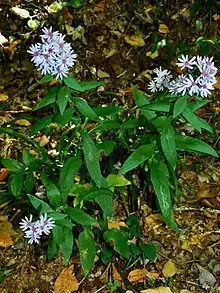 | |
| Scientific classification | |
| Kingdom: | Plantae |
| Clade: | Tracheophytes |
| Clade: | Angiosperms |
| Clade: | Eudicots |
| Clade: | Asterids |
| Order: | Asterales |
| Family: | Asteraceae |
| Tribe: | Astereae |
| Subtribe: | Symphyotrichinae |
| Genus: | Symphyotrichum |
| Subgenus: | Symphyotrichum subg. Symphyotrichum |
| Section: | Symphyotrichum sect. Symphyotrichum |
| Species: | S. undulatum |
| Binomial name | |
| Symphyotrichum undulatum | |
 | |
| Native distribution[2] | |
| Synonyms[2] | |
|
Basionym
Alphabetical list
| |
Description
Symphyotrichum undulatum is a perennial, herbaceous plant that flowers from August through October, growing to heights between 30 and 160 centimeters (1 and 5 feet) from a cespitose rootstock. The roots can have short rhizomes or branched and woody caudices.[3]
Its flowers have blue to purple, or sometimes lilac, ray florets and cream or light yellow, then purple, disk florets.[3]
Fruit
The fruits (seeds) of Symphyotrichum undulatum are not true achenes but are cypselae, resembling an achene but surrounded by a calyx sheath. This is true for all members of the Asteraceae family.[4] After pollination, they become dull purple to light brown or tan with an oblong-obovoid compressed shape, 1.7–2.2 mm[lower-alpha 1] in length with 3–4 nerves, and with a few stiff, slender bristles on the surface (strigillose). They also have tufts of hairs (pappi) which are cream or rose-tinged and 3.5–5 mm in length.[3]
Chromosomes
The species has a monoploid number (also called base number) of eight chromosomes (x = 8). Individual plants with 16 and 32 sets of its chromosomes have been found, meaning the species is diploid and tetraploid.[3]
Conservation
As of October 2022, NatureServe listed S. undulatum as Secure (G5) globally; Secure (S5) in New Jersey, New York, North Carolina, and West Virginia; Apparently Secure (S4) in Virginia; Vulnerable (S3) in Indiana and Nova Scotia; and, Critically Imperiled (S1) in Illinois. The species' global status was last reviewed on 25 July 2016.[1]
Notes
- To convert millimeters to inches, divide the number of millimeters by exactly 25.4.
References
- Barkley, T.M.; Brouillet, L.; Strother, J.L. (2006). "Asteraceae". In Flora of North America Editorial Committee (ed.). Flora of North America North of Mexico (FNA). Vol. 19. New York and Oxford: Oxford University Press. Retrieved 3 October 2022 – via eFloras.org, Missouri Botanical Garden, St. Louis, MO & Harvard University Herbaria, Cambridge, MA.
- Brouillet, L.; Semple, J.C.; Allen, G.A.; Chambers, K.L.; Sundberg, S.D. (2006). "Symphyotrichum undulatum". In Flora of North America Editorial Committee (ed.). Flora of North America North of Mexico (FNA). Vol. 20. New York and Oxford: Oxford University Press. Retrieved 10 July 2021 – via eFloras.org, Missouri Botanical Garden, St. Louis, MO & Harvard University Herbaria, Cambridge, MA.
- NatureServe (1 October 2022). "Symphyotrichum undulatum Wavyleaf Aster". explorer.natureserve.org. Arlington, Virginia. Retrieved 19 October 2022.
- POWO (2022). "Symphyotrichum undulatum (L.) G.L.Nesom". Plants of the World Online. Royal Botanic Gardens, Kew. Retrieved 19 October 2022.

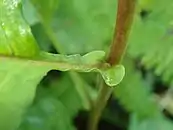
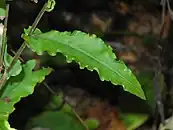
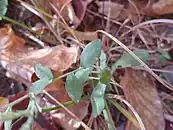
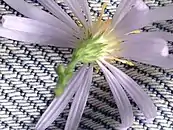
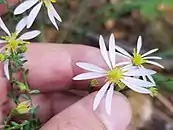
.jpg.webp)